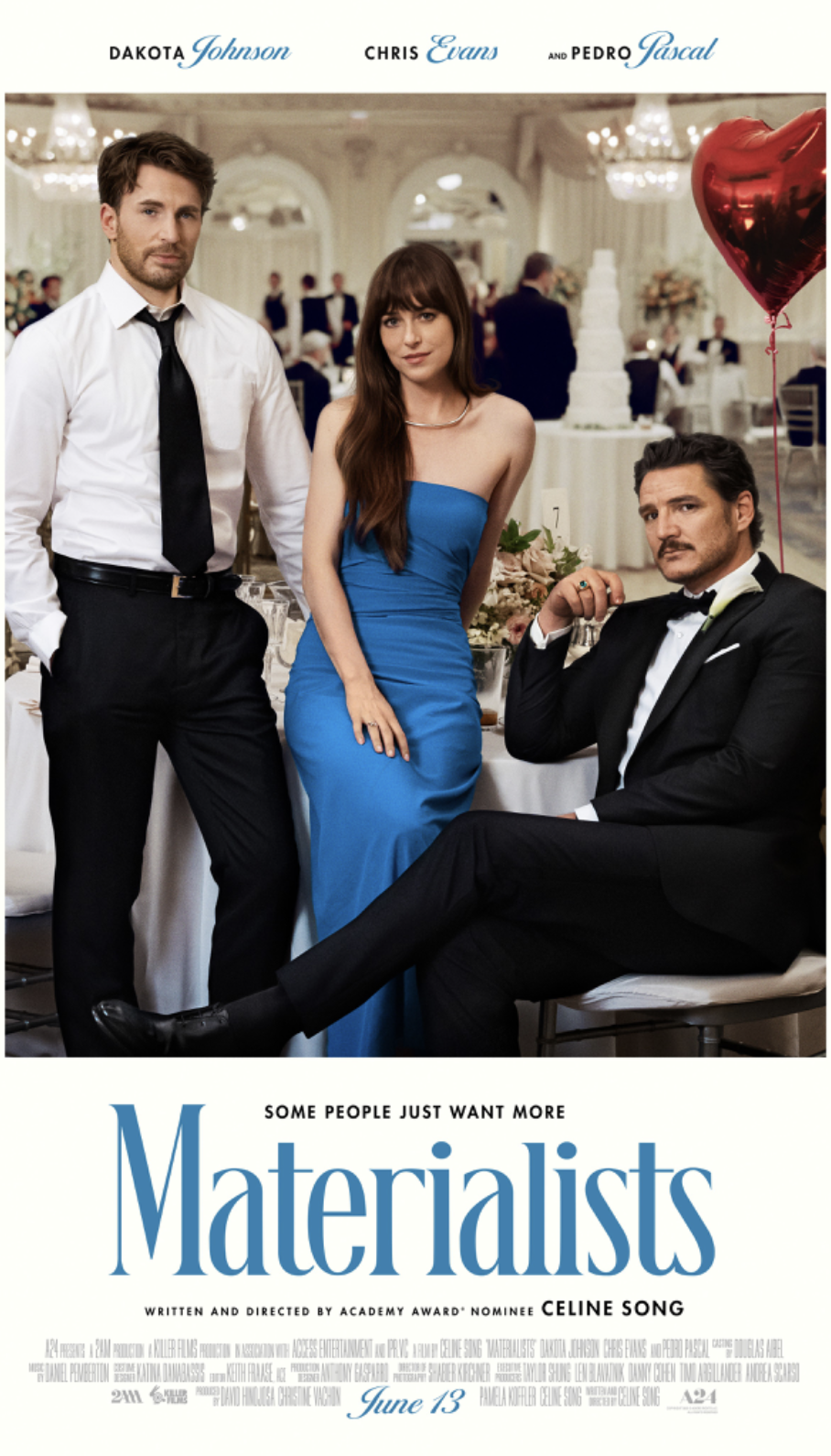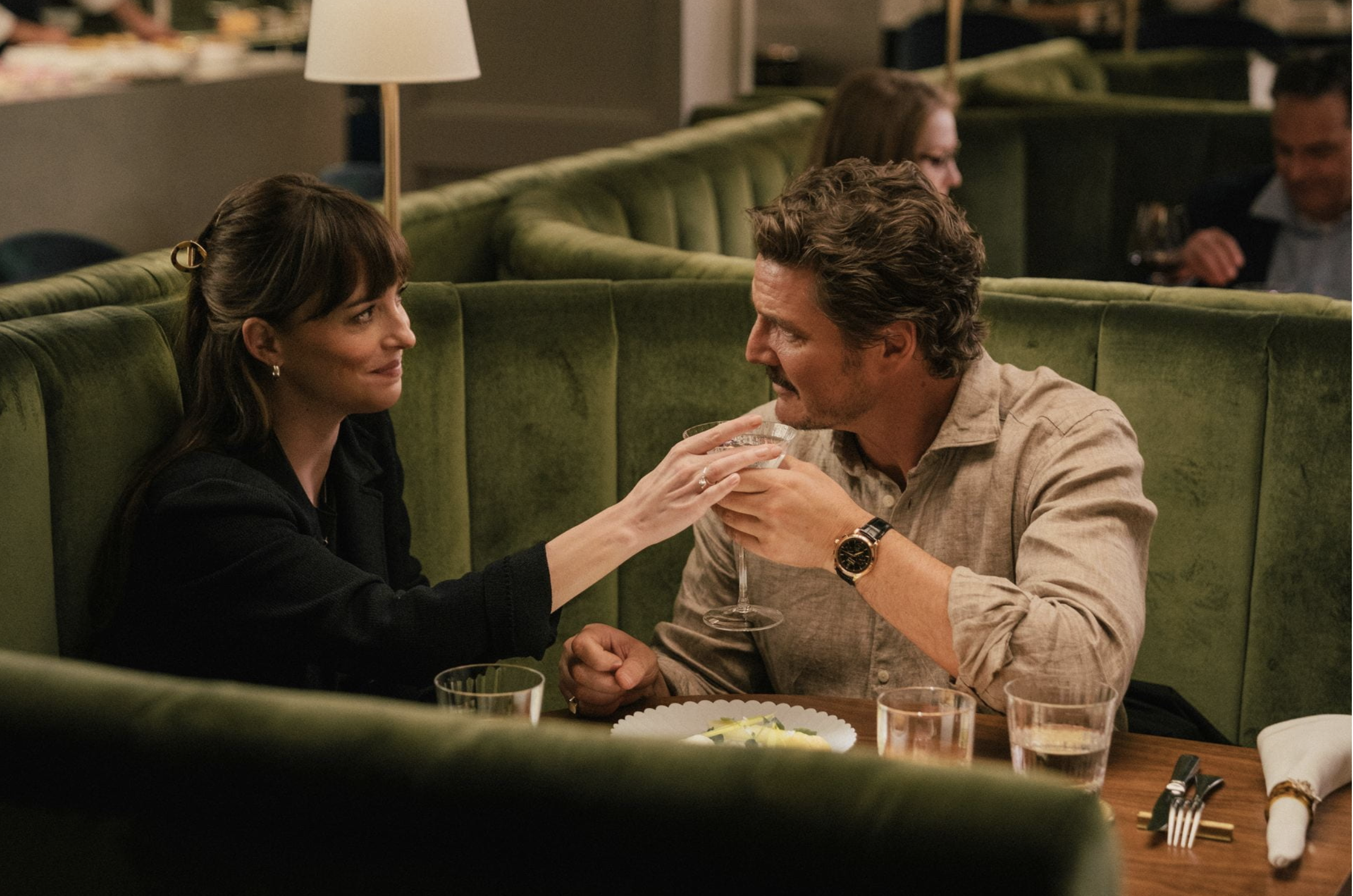Love as Performance: Materialists
How modern dating turns relationships into business transactions.
How modern dating turns relationships into business transactions.

There once was a girl named Sabrina, a chauffeur's daughter who had always been in love with David, the playboy son of her father's rich employers. However, upon her return from Paris after two years, their romance was threatened by David's older brother, Linus. A typical love triangle, you might think.
Celine Song's "Materialists," though, isn't your typical romance. Instead of heat and chaos, we see restraint, calculation and an enthralling look into how modern dating flattens intimacy into data points—as if making a business deal.
At the heart of "Materialists" is Lucy, the protagonist. She is a high-end matchmaker at Adore in the bustling city of New York, whose job is to engineer perfect matches based on education, income, status and other quantifiable metrics. She treats relationships the way a hedge fund manager might treat portfolios. Her approach is logical, optimized and carefully curated.

This quantification of love is central to the psychology behind the movie: when romance becomes a marketplace, people are no longer people; they're profiles, checklists, commodities with unique selling points that may match with another complementary good in the market—and that is exactly how the dating business works. As Lucy states in the film, "Dating is a risk."
In many ways, Lucy mirrors the very apps and algorithms like Tinder and Hinge that dominate the modern dating world. She is not just arranging dates—she's curating brand alignments. This professional detachment, however, reveals a deeper emotional void. Her desire for control masks an inability to truly connect—a tension many modern daters feel when faced with endless options but little authenticity.
It is not a coincidence that romance is the highest-selling genre; we are deprived of it in our daily lives, seeking it through stories and screens.
This brings us to one of the film's core thematic tensions: for centuries, romantic conflict has been emblematic of a larger societal split between material comfort and emotional fulfillment. How could Linus's family approve of Sabrina when she was merely their chauffeur's daughter?
Similarly, in "Materialists," we meet Harry, the groomsman, who encounters Lucy, the matchmaker, at his brother's wedding. Harry is a wealthy financier who offers security and status. On the other hand is John, Lucy's ex, a struggling actor who enters as a waiter at the wedding, representing vulnerability, uncertainty and emotional risk.
The contrast between the two men isn't just romantic—it's ideological. Lucy's indecision isn't about picking the "right man"—it's about confronting what she values more: a stable life or a real emotional connection. In choosing between Harry and John, Lucy is essentially choosing between two worldviews: one driven by calculated certainty, the other by emotional truth.
Harry represents the elusive, perfect partner who is emotionally intelligent, physically attractive, successful, and socially compatible—often known as the "Unicorn" in dating culture. The film reveals how this fantasy is often built on contradictions. This pursuit of perfection is amplified by dating apps, which turn the search for love into an endless scroll.
The film subtly critiques how dating platforms foster a sense of disposability: if one match doesn't work, swipe to the next. Emotional connection takes a backseat to market logic, where novelty and optimization override patience and intimacy.

Today, we are constantly performing and selling ourselves, whether on social media or on dating sites. Polished exteriors and curated personas reflect a world where social standing and appearances often substitute for emotional substance. This performative element of dating—seen on multitudes of dating platforms—is a hallmark of the modern romantic psyche.
Love becomes part of the resume, and relationships become projects. The movie suggests that behind many of today's relationships lies an implicit pressure to maintain a brand rather than embrace vulnerability. True intimacy requires dropping the act, which is something that Lucy struggles with until she's forced to confront her own emotional contradictions.
"We've turned love into a business transaction, complete with profit margins and return on investment calculations." — A reflection on modern dating culture
Materialists doesn't provide easy answers, and that's its strength. It forces viewers to ask uncomfortable questions about how we date, what we prioritize, and whether we're seeking connection or curation. The film's psychological depth comes from its willingness to explore the messiness of real emotion in a world obsessed with perfection and standards set by society.
The modern dating landscape has created what psychologists call "choice overload"—when too many options lead to decision paralysis and decreased satisfaction. Dating apps promise endless possibilities, but this abundance can actually make us less committed and more anxious about missing out on someone "better."
Research shows that when people have too many romantic options, they often become more superficial in their selection criteria, focusing on easily quantifiable traits rather than deeper compatibility. This leads to relationships that look good on paper but lack emotional depth.
Ultimately, Materialists is about reclaiming humanity in a digital age. It's a call to resist reducing ourselves to data points and to remember that love isn't something to be optimized—it's something to be felt. The film suggests that genuine connection requires vulnerability, patience, and the courage to be imperfect.
Lucy's journey throughout the film represents many people's struggle to break free from the performative aspects of modern dating. Her professional success in matching others contrasts sharply with her personal inability to connect authentically, highlighting how expertise in love's mechanics doesn't guarantee understanding of its essence.

The film also explores how economic pressures shape romantic choices. In a world where financial security is increasingly difficult to achieve, the appeal of a partner who offers stability becomes more pronounced, even if it means sacrificing emotional fulfillment.
What makes Materialists particularly relevant is its examination of how technology has changed not just how we meet people, but how we think about relationships themselves. Dating apps have gamified romance, turning the search for love into a series of swipes, likes, and matches that can feel more like a video game than genuine human connection.
This algorithmic approach to love has psychological consequences. It can make us more impatient, more focused on superficial traits, and less willing to work through the natural challenges that come with getting to know someone deeply.
How do we navigate modern dating while preserving our humanity? Share your thoughts on authentic connection in the digital age on our Instagram @filmpsychologee!
In the end, Materialists suggests that love is not about finding the perfect match on paper, but about choosing to be vulnerable with another person. It's about recognizing that real relationships require emotional risk and the willingness to be imperfect together.
Lucy's ultimate choice—whichever direction it goes—represents a broader decision we all face in modern dating: Do we choose the safety of logical compatibility, or do we risk everything for the possibility of genuine emotional connection?
The film reminds us that love, at its core, is not a performance or a transaction. It's a leap of faith that requires us to show up as our authentic selves, flaws and all. And perhaps most importantly, it suggests that love is easy when we stop trying so hard to perfect it.
"Love is easy. It just happens, no performance needed."
This simple truth cuts through all the complexity of modern dating culture. While we've created elaborate systems to optimize our romantic lives, the film argues that authentic love remains beautifully, frustratingly, and wonderfully simple—it just requires us to be brave enough to feel it.